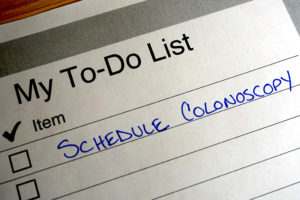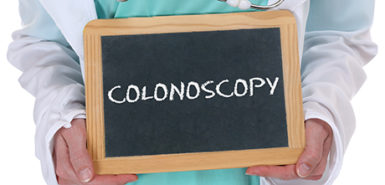
If you’re pushing 50 and haven’t had a colonoscopy, here’s more evidence that it’s time.
A recent study supports the new guidelines that urge screening for colorectal cancer at age 45—and don’t wait until 50, as that had been the previous guideline.
If you have a family history or other risks, you might need to start sooner.
The study found that women who started screening at age 45 had a 50% to 60% lower risk of developing colon cancer than those who had no screening. In addition, those who started screening at ages 45-49 experienced much lower rates of colon cancer through age 60, versus those who began at ages 50-54.
Both the American Cancer Society and the U.S. Preventive Services Task Force have updated their recommendations to start colorectal cancer screening at 45.
While this study involved women, the recommendations apply to men as well.
“It dropped for all average-risk people to 45 from 50 because of the increasing amount of evidence of the prevalence of colorectal cancer in younger people, including the male population,” said Randall Meisner, MD, a Corewell Health gastroenterology specialist.
The gold standard
Dr. Meisner said certain risk factors mean some patients might need to start screening for colorectal cancer sooner than age 45.
These patients include those with a personal or family history of colorectal cancer or polyps—particularly large polyps—and a history of inflammatory intestinal conditions, such as chronic ulcerative colitis and Crohn’s disease, diabetes and obesity.
Rates of colorectal cancer in the United States are also higher among the following populations: Native American/Alaskan Native, Native Hawaiian, other Pacific Islander, and Black people, particularly Black males.
“As we like to say, colorectal cancer screening begins when you meet your physician,” Dr. Meisner said.
If you have a family member who has colon cancer, you should get your first screening at least 10 years before reaching the age they were when doctors diagnosed them with cancer, he said.
“While 45 is the standing recommendation, speak with your physician about other risk factors that might mean you need it before then,” he said.
The good news: Colorectal cancer is one of the most preventable cancers because it typically develops from detectable polyps that a physician can remove before the polyps turn cancerous.
And that all happens during a colonoscopy, Dr. Meisner said.
During the procedure, doctors use a thin, tube-like instrument with a light and lens to see inside the colon and rectum.
The instrument can also remove polyps or take tissue samples.
This gold-standard screening procedure gives patients the best chance of detecting abnormalities and removing them immediately.
Patients must prepare the day before with fasting, laxatives and fluids to clear their bowels. Sedation prevents discomfort during the procedure.
“The prep is the worst part, but it keeps you honest,” Dr. Meisner said. “Hopefully you only have to do that once every 10 years. And preparing for a colonoscopy is much better than colon surgery and cancer.”
Other screening options include CT colonography, which requires bowel prep but not sedation.
If this strictly visual scan detects polyps, the polyps cannot be removed during the procedure.
Noninvasive stool-based molecular DNA tests, such as the widely known Cologuard test, use stool cards to collect samples at home for fecal immunochemical testing. There’s no bowel prep, but this screening tool does not detect all cancer or large polyps.
The Cologuard test requires patients to return for a colonoscopy for any abnormalities found, and it can produce false positives that may cause patients unneeded stress, Dr. Meisner said.
“Any test is better than no test at all,” he said. “However, for a person of average to good health, the best test is a well-done colonoscopy.”
Dr. Meisner stressed that colon cancer is the most preventable cancer because colonoscopy is such a reliable screening tool.
And ultimately, the new recommendation to start screening at age 45 may help prevent many cancer cases.
 /a>
/a>
 /a>
/a>
 /a>
/a>